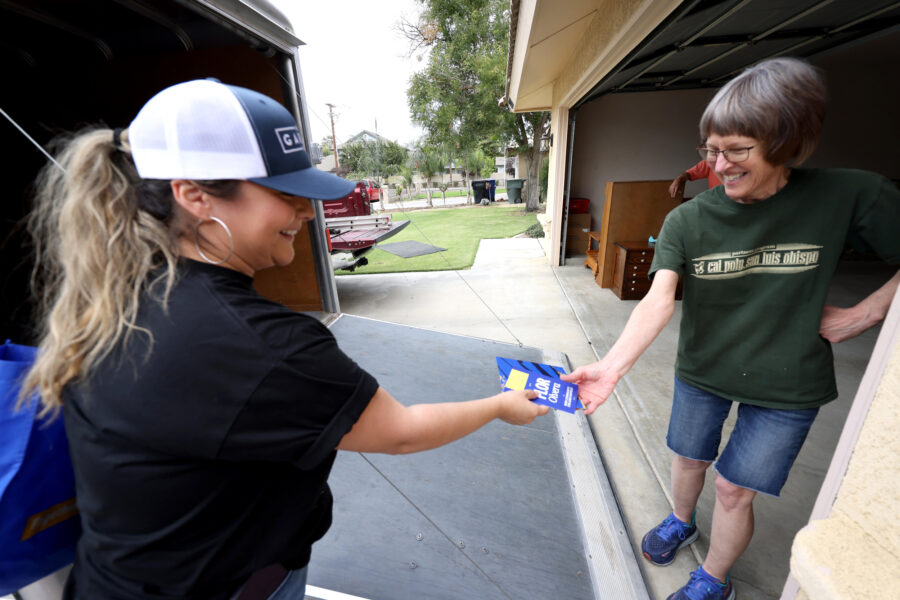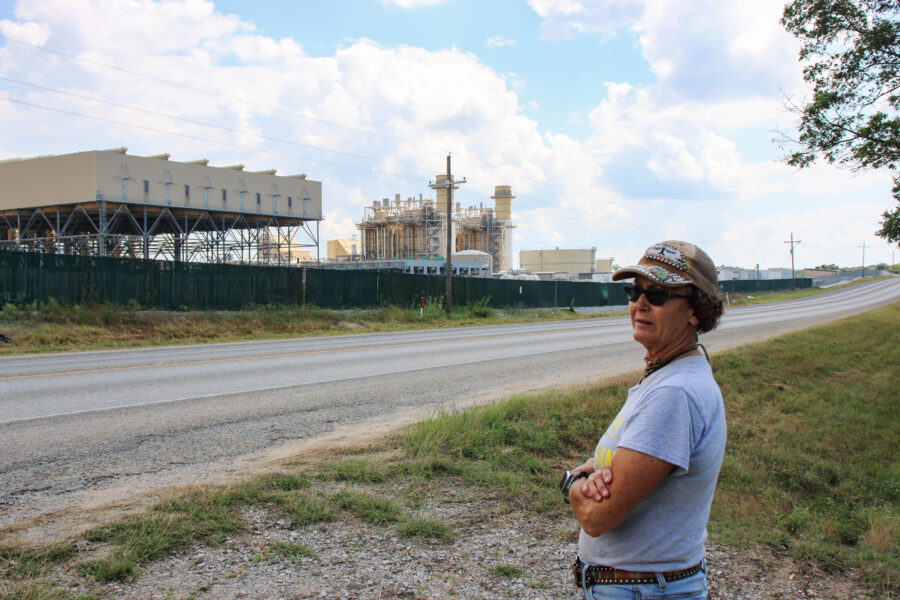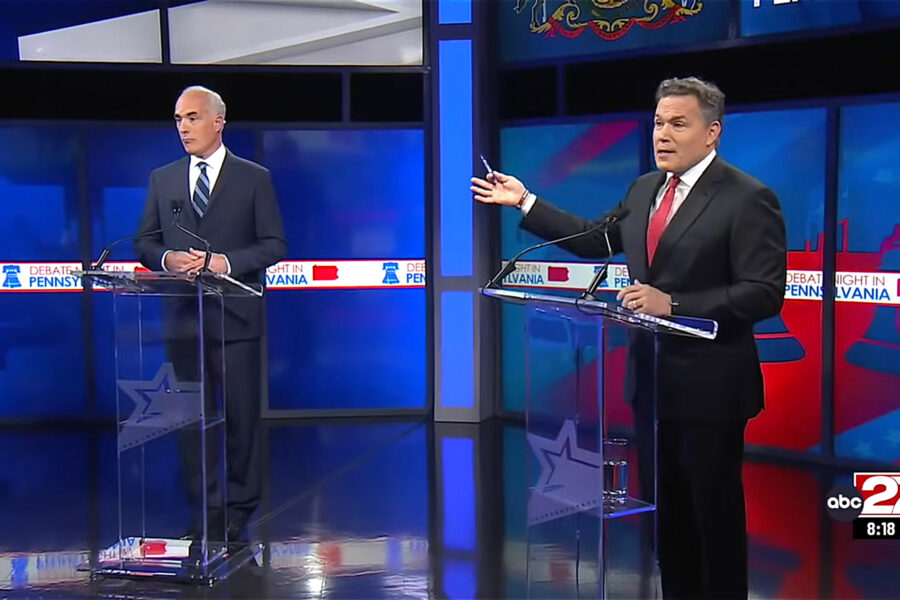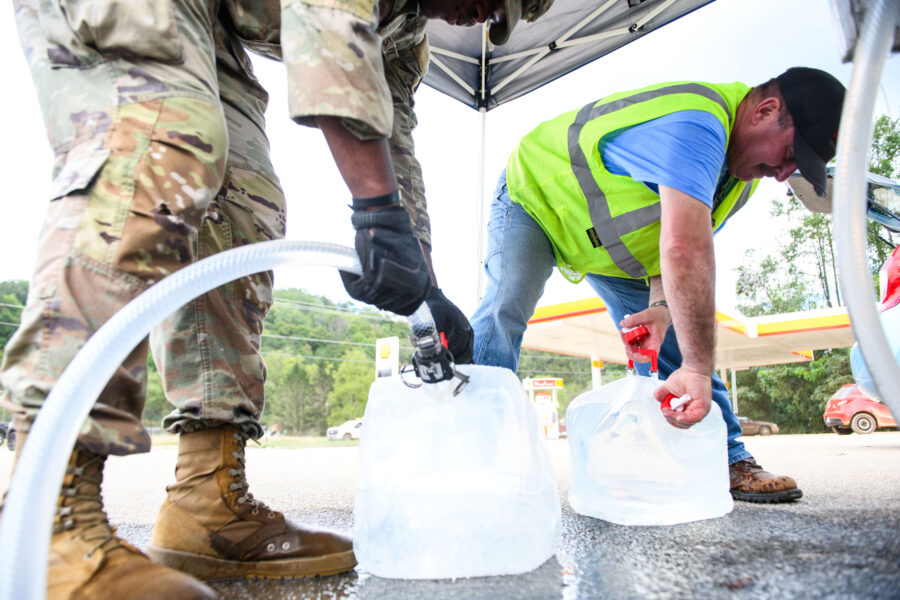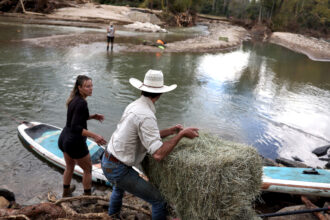In Competitive Purple Districts, GOP House Members Paint Themselves Green
The Republican congressman for New York’s increasingly flood-prone lower Hudson Valley and Finger Lakes region, Rep. Marc Molinaro, tells his constituents that urgent action is needed on climate change.
In California’s Sierra Nevada, scarred by recent wildfires unprecedented in recorded history, Republican Rep. Kevin Kiley pitches himself as one of the state’s biggest champions of clean energy.
But the two freshman Republicans have voted reliably with the House GOP majority to undo efforts to cut greenhouse gas pollution and accelerate the transition to renewable power and electric vehicles. And they are strong supporters of former President Donald Trump, who has endorsed both candidates and promised to deliver a fatal blow to existing climate policy if re-elected.
Explore the latest news about what’s at stake for the climate during this election season.
Molinaro and Kiley are among a group of GOP members whom environmental advocates are targeting as they work to flip the House of Representatives back to Democratic control. The activists view the congressional races and electing Vice President Kamala Harris to the presidency as equally crucial for preserving and extending the historic climate progress made during President Joe Biden’s term.
They have set their sights on Republicans who were narrowly elected in 2022 and face tough reelection battles in swing or Democratic-leaning districts this November. Voicing concern over climate change is one way vulnerable GOP members have broken from their party’s mainstream to appeal to voters across the political spectrum, especially in districts that have been battered by extreme weather and fire.
Environmental groups are working in the districts to deliver the message that these Republican members’ actions belie their words on climate change.
“They’re addressing it now because their constituents are asking them about it, and are feeling the pain of the results of man-made climate change,” said Michael Cassesso, political and advocacy director for NRDC Action Fund. “They’re paying lip service to dealing with the everyday impacts of climate change, while not actually addressing the root cause of it in a meaningful way.”


Molinaro, Kiley and the National Republican Congressional Committee did not respond to requests for interviews. But the NRCC, which coordinates the party’s effort to maintain control of the House and is working in these vulnerable districts, has characterized the Biden-Harris administration’s climate policy as an “extreme energy boondoggle” that will increase prices, destroy jobs and undermine national security. The NRCC maintains that Republican efforts to roll back climate policy and increase oil and gas production are “broadly popular with both the American public and voters in battleground states.”
A key test of that claim is now underway in an even smaller geography—the small subset of the 435 House seats that are up for grabs, many of them in solidly blue states that Democratic voters have taken for granted in recent national elections.
House Battlegrounds in Enviros’ Turf
Several of the House seats Democrats have focused on flipping are in California and New York—two of the states with the lowest voter turnout in 2022.
Democrats exceeded expectations elsewhere in that midterm election, defying history and beating back a predicted “red wave” of Republican victories.
In 2024, Democrats need to pick up just four seats to regain control of the chamber. The Democratic Congressional Campaign Committee has identified 33 districts that it considers in play, including 16 Republican-held seats in Congressional districts that, according to an analysis by Daily Kos Elections, would have voted for Biden in 2020 in their current configurations. Nine of those seats are in California and New York, where nonpartisan redistricting after the 2020 census carved out many more competitive seats in states the Democratic Party had long treated as safe in national and statewide races.
“You had two states where they have not had to worry about base turnout as a serious issue when it comes to federal races for over a decade,” Cassesso said. “So you had an infrastructure in these two states that had kind of decayed.”
Environmental groups believe they are especially well-positioned to help bring out voters in the places that make a difference for flipping the House back to Democratic control. “The [NRDC] Action Fund’s base of support—its membership, its donors, its network, its relationships—are deepest in California and New York, so we are poised to be an organization that can play a role in these races,” Cassesso said. “What we’ve been doing since 2023, through direct voter communication and support of our candidates, is helping to rebuild that turnout machine and the persuasion machine that we need to win back these districts.”

Likewise, the group Food & Water Action, an affiliate of Food & Water Watch, which helped lead a successful drive to ban fracking in New York in 2020, is now staging rallies in that state to call out the environmental voting records of vulnerable Republican members of Congress. “New York is a place where Food & Water Watch has been working for a long time and has a lot of power that we’ve built up to pass legislation, so we’re excited to be using that power with these rallies,” said Sam Bernhardt, the New York-based political director for Food & Water Action.
One of the group’s targets is Molinaro, who represents New York’s 19th district, which spans 11 counties and includes the Catskill mountains and the cities of Binghamton and Ithaca. Molinaro is well-known statewide, having run unsuccessfully in 2018 to unseat New York’s former Democratic Gov. Andrew Cuomo. Today, Food & Water Action is reminding voters of Molinaro’s stance in favor of fracking during the gubernatorial race.
Molinaro’s words on fracking at that time were hardly a rallying cry—he said “a limited, closely monitored, [state]-regulated and watched pilot effort is worth considering.” As he runs for re-election in a district he won in 2022 by less than 2 percentage points, he continues to walk a fine line on energy and environmental issues—voting with the GOP majority for more oil and gas development and calling for “urgent action on climate.”
“Our climate is changing, and a lost focus on resource preservation, physical infrastructure investment, and conservation-based solutions is leaving us more vulnerable than ever,” Molinaro wrote last fall in an editorial in Binghamton’s Press and Sun-Bulletin. He noted the increasing insurance premiums due to flooding in Tompkins County, where newly revised Federal Emergency Management Agency maps have greatly expanded areas of flood risk along the tributaries of Cayuga Lake and the low-lying city of Ithaca at its south end.
But environmental activists view Molinaro’s proposal for “decisive action” as weak. (His bill would reduce the local cost share for some federally funded flooding mitigation projects and launch a nationwide study of agricultural vulnerabilities to flooding.) Food & Water Action activists rallied in Hudson, New York, in late August to protest Molinaro’s votes in favor of repealing the Inflation Reduction Act’s clean energy investments and for expanding oil and gas development. “Molinaro Protects Fossil Fuel Corps, Not New Yorkers,” said one sign.

Molinaro’s Democratic opponent, civil rights attorney Josh Riley, who served as general counsel to former Sen. Al Franken (D-Minn.) on the Senate Judiciary Committee, has blasted the Republican for his environmental record. In March, after Molinaro touted his support for watershed and wetland protection in an X post, Riley responded, “Except when you voted to slash EPA funding, voted to block conservation efforts, and voted against a ban on drilling in the Del. River Basin, and so on.”
Riley noted Molinaro’s 19 percent pro-environmental voting record on the League of Conservation Voters’ scorecard. That score is actually higher than the current House Republican caucus’ average of 4 percent. Now, voters in a district that Biden would have won in 2020 by 4.5 percentage points, according to the Daily Kos analysis, will decide whether Molinaro is moderate enough for their diverse electorate.
Playing Defense and Offense in California
California has so many close districts that Democrats—and the environmentalists who support them—are playing defense as well as offense.
Climate activists are excited about the Democrat running to replace Rep. Katie Porter in historically conservative Orange County, California, State Sen. David Min. Min, a former law professor who chairs the Senate’s natural resources and water committee, once led an (unsuccessful) effort to ban oil and gas drilling off California’s coast. In September, Gov. Gavin Newsom signed into law a neighborhood-scale decarbonization bill Min authored to accelerate a transition away from natural gas.
“We have a strong set of candidates in both defense and pickup races in districts across California that could really be the key to having a pro-environment House come November,” said Mary Creasman, chief executive officer of California Environmental Voters, an advocacy organization.
High on the list of House members environmentalists would like to see replaced is Rep. Kevin Kiley, who, like Molinaro, gained a statewide profile as an antagonist of his state’s governor, joining a crowded field of Republicans who challenged Newsom in a failed 2021 recall.
In Congress, Kiley has co-sponsored two bills to protect gas stoves and urged the Senate to pass the “Preserving Choice in Purchasing Vehicles Act,” a bill the House passed last year that would override Newsom’s executive order requiring new vehicles in California to be zero emission by 2035. Several other states have planned to adopt the measure. “No state has gone further down the road of overreaching, overbearing, unattentive regulation to the needs of its citizens than California has,” he said on the House floor.

Kiley’s challenger is Jessica Morse, who worked for both the State and Defense departments before taking a post in Newsom’s administration spearheading development of a $2.7 billion wildfire resilience strategy for California.
Environmentalists say it is an especially fitting background for the sprawling 3rd Congressional District, which stretches from Death Valley in the south to the northern Sierra Nevada, where residents are still coping with the aftermath of record-breaking 2021 wildfires.
“The Sierra is on the front lines of catastrophic fire issues,” Creasman said. “It’s in a region that is more and more valuing and prioritizing environmental leadership in their representation.”
Kiley has touted his work advocating for more federal assistance for wildfire victims. He acknowledges that climate change is a factor in the state’s punishing droughts and devastating wildfires, but he has blamed “incompetent government performance” as a primary cause, citing poor forest management and water-saving and -storage failures (Morse points out, however, that as a state assemblyman Kiley voted against government investments in forest health and fuel breaks that the California fire officials believe already have helped protect communities.) Kiley talks about technological innovation as the key to solving climate, as opposed to curbing fossil fuel consumption.
In a district that favored Trump by 1.8 points, Morse does not talk directly about climate change or fossil fuels on her website. Instead, she focuses on the need to address skyrocketing home insurance rates, and she details a multi-point plan for improving wildfire resilience. “I’m certainly a champion of all of the macro climate solutions—transitioning to clean energy, transitioning out of fossil fuels,” Morse said in an interview. “But what I find is that when talking to people in the district, they want to talk about front-yard issues, and the climate impacts for us, day-to-day, are fire, fire insurance, water and heat.”
She stresses solutions on the campaign trail because of her unique expertise, she said. Morse sees the 3rd district as “an important keeper of California’s climate resilience”; investments in restoring its ecosystems would help replenish water resources the state relies on and help its forests better store carbon. “There is not anyone else in Congress who is going to have this expertise in forestry and wildfire like I do,” Morse said.
Environmental groups say they are confident climate is a winning issue for Democrats in such competitive races, pointing to research they commissioned this summer that shows three-quarters of voters, including 86 percent of swing voters, believe climate change is at least a major problem, up five points from only a year ago. “While swing voters aren’t with us 100 percent on every climate and energy-related issue … swing voters strongly prefer the Democratic approach of supporting clean energy and climate action over Republicans’ focus on boosting fossil fuel production,” said the polling report from Global Strategy Group,
In some swing districts, though, Democrats have staked out positions on fossil fuels that have cost them the support of environmental activists. Conspicuously missing from the California Environmental Voters’ list of endorsements is Rudy Salas, a Democrat taking a second run at California’s 22nd District in the southern San Joaquin Valley. In the area that now makes up the district, Biden won by 12.9 points; Republican David Valadao beat Salas in 2022 by 3 points.
Democracy in Color, an advocacy nonprofit focused on the intersection of race and politics, called the district, where the majority of residents are Latino, “one of the most flippable districts in the country.” The United Farm Workers has endorsed Salas, and Democracy in Color predicted that Latino turnout will determine the outcome of the election.
But the district includes Kern County, the center of California’s oil industry, which Salas has vowed to support if elected to Congress. “I’ll continue to stand up for these jobs here in California where we produce energy with the highest environmental standards,” he said in a recent interview with central California’s Sun-Gazette newspaper.

A former state assemblyman, Salas voted against a number of greenhouse gas reduction measures, reflected in a 12 percent pro-environmental voting record in 2022, his last year in office—extremely low for a Democrat on the California Environmental Voters scorecard. Salas took nearly $273,000 in campaign contributions from oil and gas interests between 2011 and 2021 while in the California Assembly, according to state campaign finance records. Valadao received more than $56,000 from the oil industry while running for the Assembly in 2010 and more than $571,000 from oil and gas interests since 2011 while serving in Congress, according to the nonprofit Open Secrets, which tracks money in politics.
The climate issue that gets the most attention in the district is water. The San Joaquin Valley is one of the world’s most productive agricultural regions, and particularly vulnerable to drought.
Valadao, whose family owns dairies and farmland, told CNN he “thinks the climate is changing,” in the leadup to his last election win. But he blamed environmental policies protecting California’s endangered fish for the region’s perennial issues with water scarcity—a position Trump recently echoed. (Valadao is one of 10 Republicans who voted to impeach Trump for inciting an insurrection in the Jan. 6, 2021, raid on the Capitol.)
The Biden-Harris administration announced an $81 million investment from the Inflation Reduction Act for water delivery system improvements to ensure a more stable supply. Millions more were directed to the region earlier from the bipartisan infrastructure bill. Salas has criticized Valadao for his vote against that bill, and has pledged to work in Congress to secure even more federal support to address the district’s water needs. But how Salas would vote on legislation directly affecting the oil and gas industry is less clear.
A Firewall to Protect Climate Progress
The Salas-Valadao matchup underscores a grim reality for those hoping for more climate action in a new Congress. Even if Democrats win enough contested seats to flip the House, they may wind up with purple district members who may not vote with the majority.
Nevertheless, environmental activists believe Democratic control of the House at least would serve as a firewall to protect much of the climate progress that has been made under Biden if—in what they see as a worst-case scenario—Trump wins and Republicans capture control of the Senate.
Nearly all Republican House incumbents have voted multiple times to repeal the clean energy provisions of Biden’s landmark climate legislation, the Inflation Reduction Act. That includes Kiley, whose California district received new USDA rural electricity grants for energy efficiency and solar systems, and Molinaro, whose New York district has benefited from a new $68 million battery plant that is resurrecting an old factory site and is expected to produce 500 jobs. Electric truck startup Harbinger Motors, awash in new orders generated by federal incentives for commercial EV purchases, recently expanded in the Orange County district of Republican Rep. Michelle Steel, one of 129 House Republicans who scored zero on the LCV environmental voting scorecard.
WIth most of the money from Biden’s signature climate legislation, both public and private, flowing to Republican districts, House Speaker Mike Johnson (R-La.) recently suggested some parts of the law may be worth saving.
“We’re now seeing some Republicans saying ‘Let’s take a scalpel to the IRA repeal,’ and trying to greenwash themselves, even though they’ve voted multiple times to repeal these tax credits,” said Craig Auster, vice president for political affairs for the League of Conservation Voters.
Steel has said she supports environmental protection goals, but not the Democrats’ approach. “We must support a free-market approach to encourage innovations that will keep energy prices from skyrocketing and reduce our dependence on foreign sources of energy,” she says on her website. And she has been burnishing her clean energy record, co-sponsoring a bipartisan geothermal energy bill passed by voice vote in the House in late September. The one-sentence measure gives small geothermal projects on public lands a speedy permitting process in areas where environmental impacts have already been studied.
Environmental advocates see this limited measure, like others touted by vulnerable Republicans, as window dressing.
“They’re not serious about the solutions that the science tells us it will take to combat the climate crisis at the scale and pace climate change is happening,” Auster said.
LCV and other environmental organizations are supporting Steel’s opponent, Democrat Derek Tran, a consumer- and employee-rights attorney, small business owner and the son of Vietnamese refugees who served in the U.S. Army Reserve for eight years.
“That Environmental Voter Who Needs a Nudge”
Support from the green groups is taking many forms.
NRDC Action has set a goal of sending 4 million text messages this election cycle, micro-targeted specifically to voters with high interest in environmental issues but with a record of not turning out to vote in recent elections.
“We don’t want to bother them, and we don’t want to waste our resources talking to someone who’s definitely going to turn out this year,” said Cassesso, who joined NRDC Action Fund last year with a long resume in campaigns, including with a startup that pioneered political peer-to-peer texting. “We want to spend our time, money and energy focused on that environmental voter who needs a nudge,” he said.
LCV Victory Fund is among the largest of the super PACs doing environmental-focused campaigning this election cycle; it has committed $15 million so far to 16 House races, money that by law cannot be coordinated with campaigns.The group has spent more than $580,000 to support Tran, according to its latest federal filing. The support has helped to even the playing field in an expensive Los Angeles media market race where Steel has outspent Tran $3 million to $1.1 million.
Separately from the super PAC, LCV is working in coordination with candidates, recruiting volunteers from its membership to go to candidates’ local campaign offices. “They do door knocking, phone calls and whatever else the campaign needs,” Auster said.
“We want to spend our time, money and energy focused on that environmental voter who needs a nudge.”
— Michael Cassesso, NRDC Action Fund
More than $50 million in donations have gone directly to candidates through the GiveGreen online platform—created by LCV and NRDC to amplify the impact of climate supporters. Individual donors are bound by the federal limit of $3,300 to any candidate committee, but the candidate knows that it came from a voter engaged on environmental issues.
“We’ll never be able to match the money that comes into elections from the fossil fuel industry through their various super PACs,” Auster said. “But the money we’re raising that goes directly to the candidates makes a huge difference for them.”
Altogether, LCV expects to devote $130 million to the 2024 elections, counting GiveGreen, LCV’s super PAC and its coordinated work with candidates, the group’s president Gene Karpinski, said recently.
Oil and gas industry spending on the 2024 election has already hit a record—$147 million—with 89 percent going to Republicans, according to Open Secrets. Only in the 2012 election cycle was there as great a partisan bias in the industry’s political donations.
That lopsided giving is mirrored in the polarization over climate policy in Congress, and a GOP-led House that is trying to undo the progress of the past four years, environmental activists say. That’s why they’re working to put the House back in Democratic hands in November.
“The [NRDC] Action Fund is not a partisan organization—our job is to support the policy goals of NRDC and to work with whoever it takes to get that done,” Cassesso said. “We haven’t seen a Republican candidate who has the stances that we would want to see. It is, unfortunately, an issue that is partisan and divisive right now when it really shouldn’t be.”
About This Story
Perhaps you noticed: This story, like all the news we publish, is free to read. That’s because Inside Climate News is a 501c3 nonprofit organization. We do not charge a subscription fee, lock our news behind a paywall, or clutter our website with ads. We make our news on climate and the environment freely available to you and anyone who wants it.
That’s not all. We also share our news for free with scores of other media organizations around the country. Many of them can’t afford to do environmental journalism of their own. We’ve built bureaus from coast to coast to report local stories, collaborate with local newsrooms and co-publish articles so that this vital work is shared as widely as possible.
Two of us launched ICN in 2007. Six years later we earned a Pulitzer Prize for National Reporting, and now we run the oldest and largest dedicated climate newsroom in the nation. We tell the story in all its complexity. We hold polluters accountable. We expose environmental injustice. We debunk misinformation. We scrutinize solutions and inspire action.
Donations from readers like you fund every aspect of what we do. If you don’t already, will you support our ongoing work, our reporting on the biggest crisis facing our planet, and help us reach even more readers in more places?
Please take a moment to make a tax-deductible donation. Every one of them makes a difference.
Thank you,
David Sassoon
Founder and Publisher
Vernon Loeb
Executive Editor
Share this article
- Republish
Disclaimer: The copyright of this article belongs to the original author. Reposting this article is solely for the purpose of information dissemination and does not constitute any investment advice. If there is any infringement, please contact us immediately. We will make corrections or deletions as necessary. Thank you.

